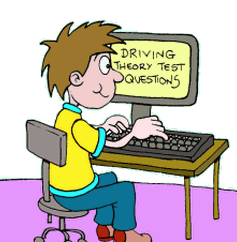What time of day should I book my driving test?
This is entirely up to you and so there is no right or wrong answer to this.
Many of us function either better in the morning or in the afternoon. If
you are a morning person then you will want to take the test in the morning
when you are at your best.
If however you are an insomniac or find it hard to get to sleep when you
have something big coming up the following day, then it would make sense to
book the test for the afternoon so you are not anxious about having to get
up early in the morning. However, if you are someone whose nerves will
build steadily during the day, then it might be best to do it in the morning
to get it over with, as it were, one way or the other!
Of course, most people will want to take the test in the daylight. Another
consideration for some can be road traffic conditions. Now, whilst most
roads are busy most of the time these days they do of course vary
considerably, and so you might like to avoid certain times of day when you
know all the roads near the test centre are really busy, as many find it
easier and less pressured to take a test on quieter roads when there is less
traffic about (and in turn less potential and developing hazards around).
Try not to put too much pressure on yourself - the good thing about the
driving test is that, if you do fail, it is easy to arrange another one:
although you have the cost of the test which is not to be sneezed at, it is
much easier to retake than school exams for instance.
Related Articles...
What to do at level crossings
When you are learning to drive you may well not come across a level crossing, depending where you live. But as a driver you certainly will come across level crossings and will need to know how to...
Nervous Driver Tips
Many people who learn to drive have a combination of nerves and excitement. Even if someone says they have no nerves and are perfectly confident when it comes to driving, the first time you get...
What details to get at an accident
When you swap details with a driver, here are the things that you should be sure to obtain from the other driver:
You need to of course get their name, their address and a contact telephone...
Thinking about a greener car
It is interesting to note that a signficant amount of the greenhouse gas emissions of the entire country comes from simply car travel: noticeably over 10% does.
Therefore if you have a type of...
More on Motorway Driving
Signs that let you know there is a motorway ahead are rectangular, and they have a green background. This shows that they are information signs on a primary road.
The part with the reference...
Tips on passing your theory test
It is up to each individual who takes a theory test to do the necessary work and preparation to put themselves in the best position to pass the test.
Rather than attempting to 'cram' the night...
What to expect at a hazard perception test
The test has fourteen different clips, as outlined in the article entitled 'how to pass the hazard perception test'.
Each of those clips starts counting down from ten to zero, in order to...
What to look for when you see a vehicle
Here is a simple check list of things to take into account when you check a used vehicle that you are considering purchasing.
Firstly, look at the engine carefully, and see if you think it has...
Pass Plus Explained
There is an old saying of driving instructors which they state once you've passed your test, and that is that now you really learn to drive. The idea is that you are about to start driving...
Medical rules and driving
There are a wide range of conditions that you can hold and still be a safe driver. However there are certain conditions that will may impact on your ability to be a safe driver and therefore could...
Back to home page of driving theory test questions

